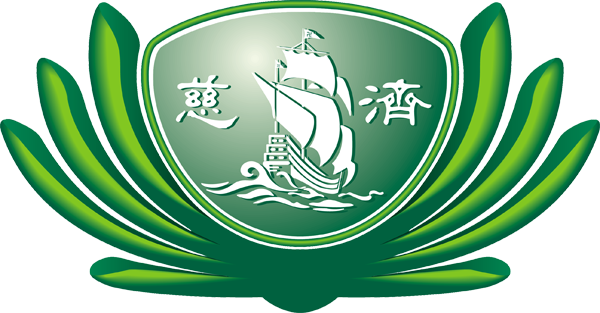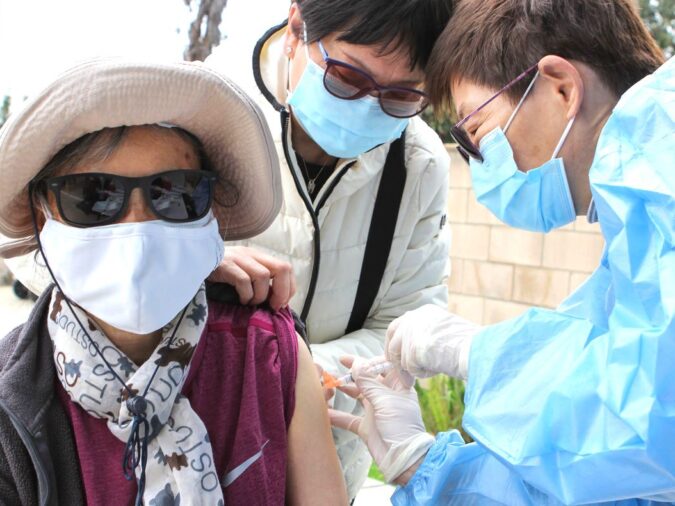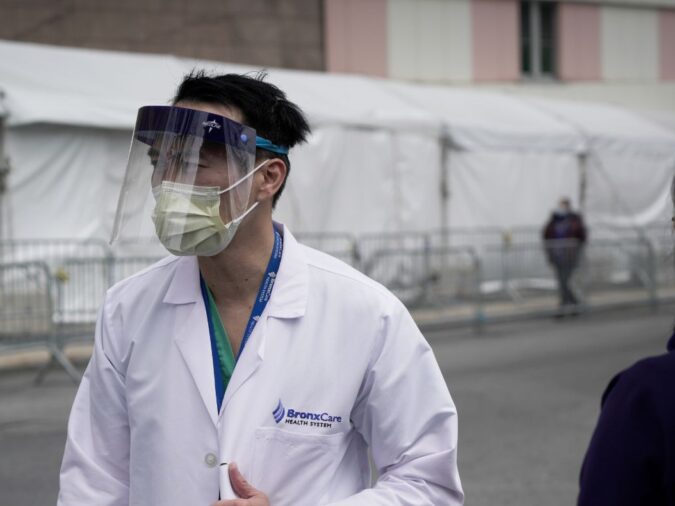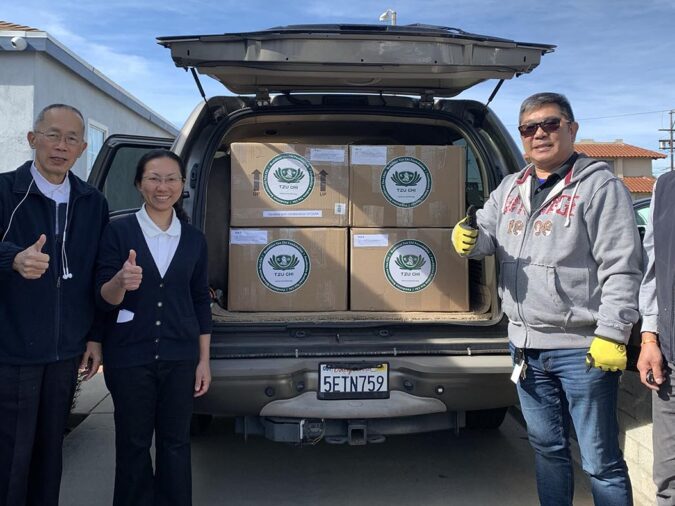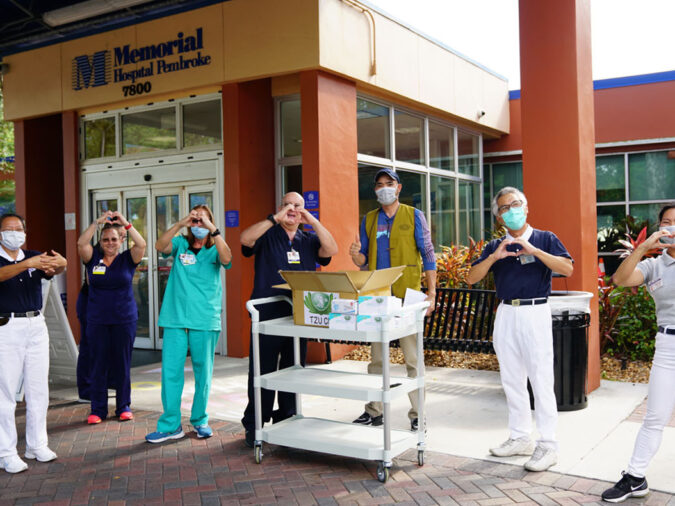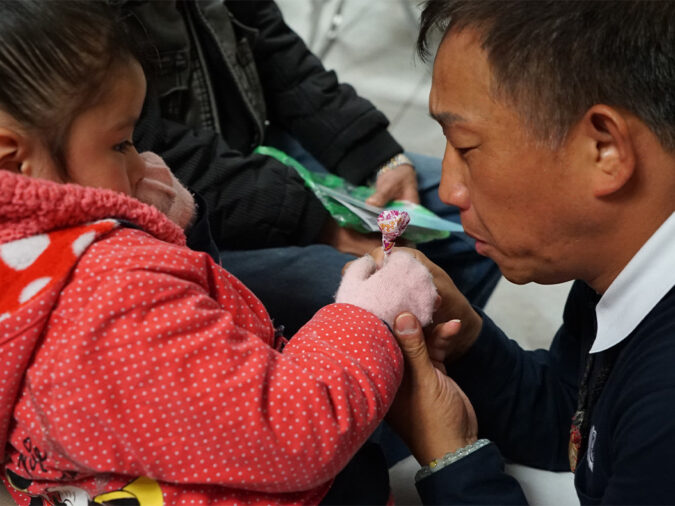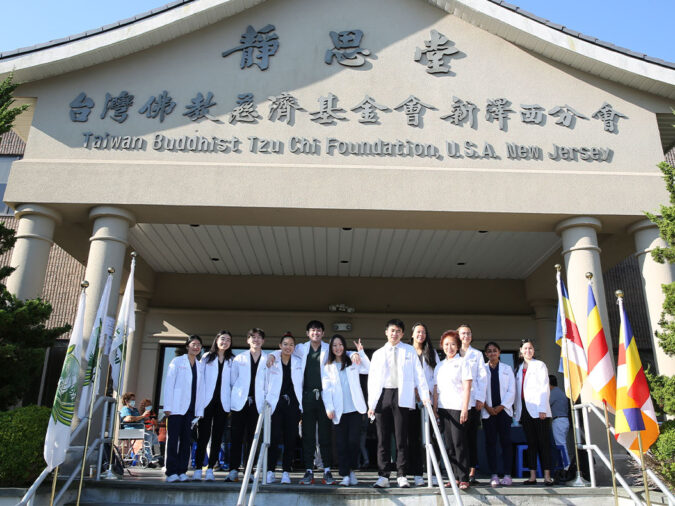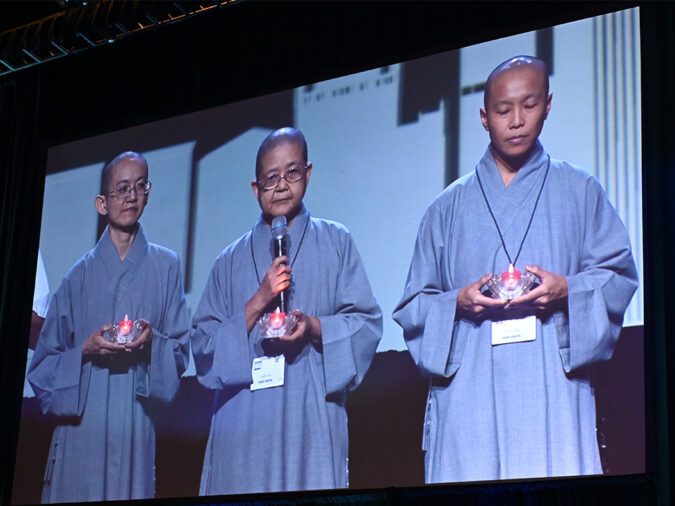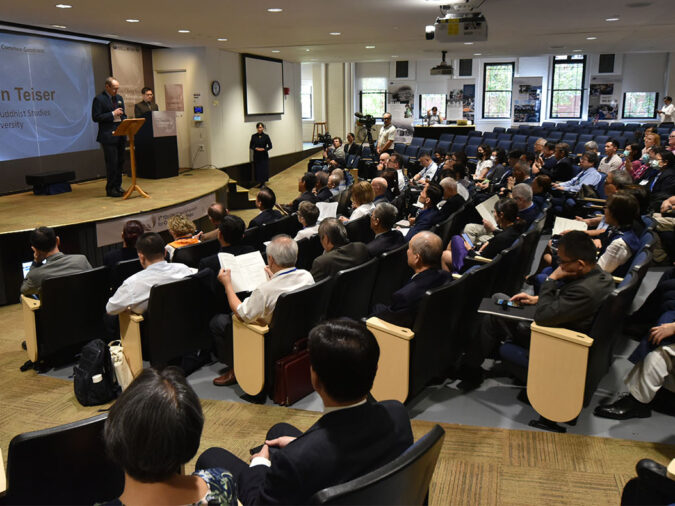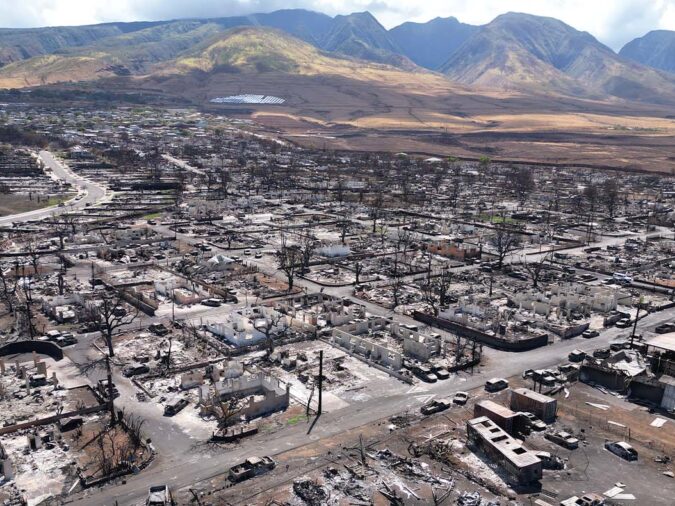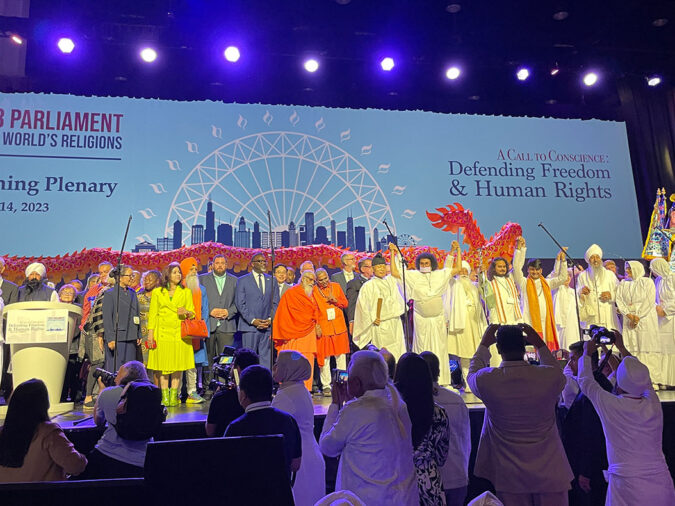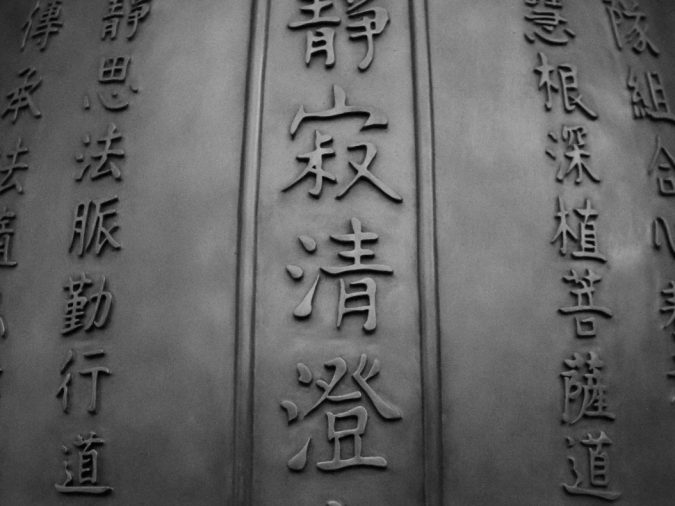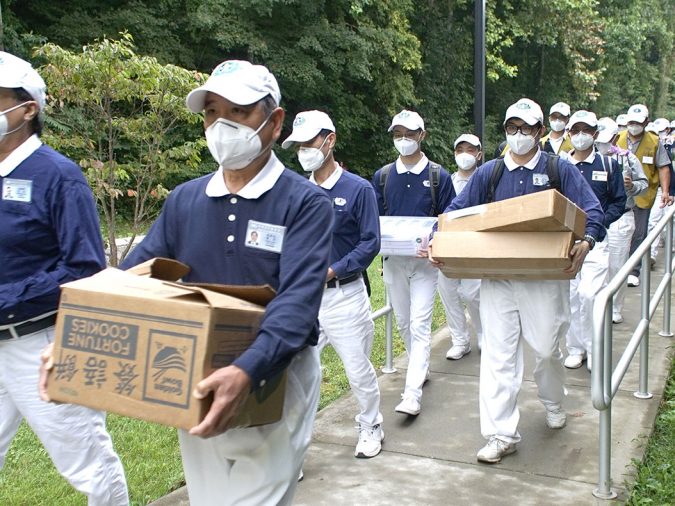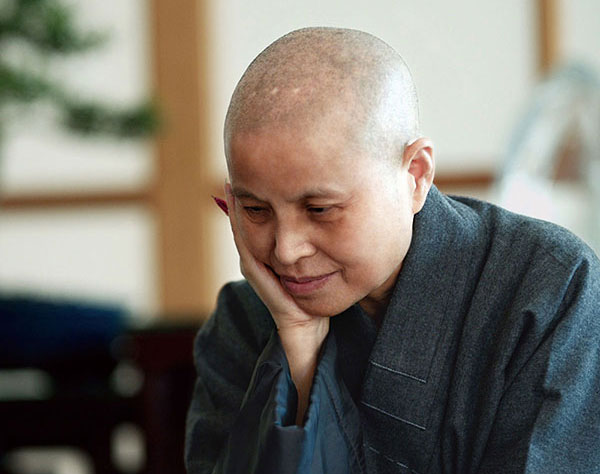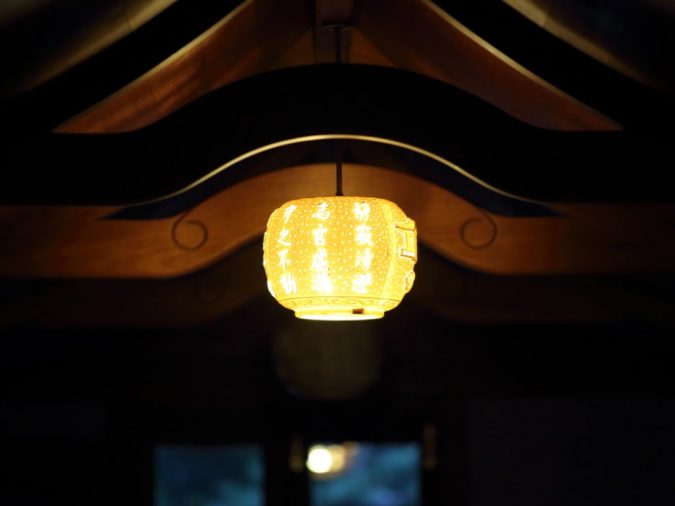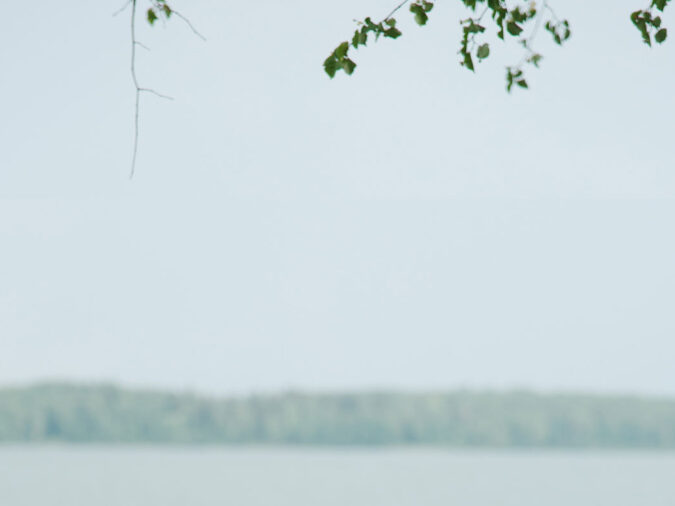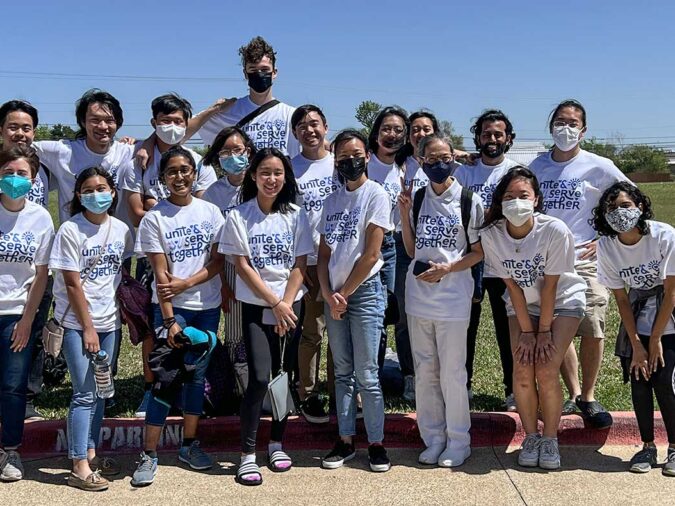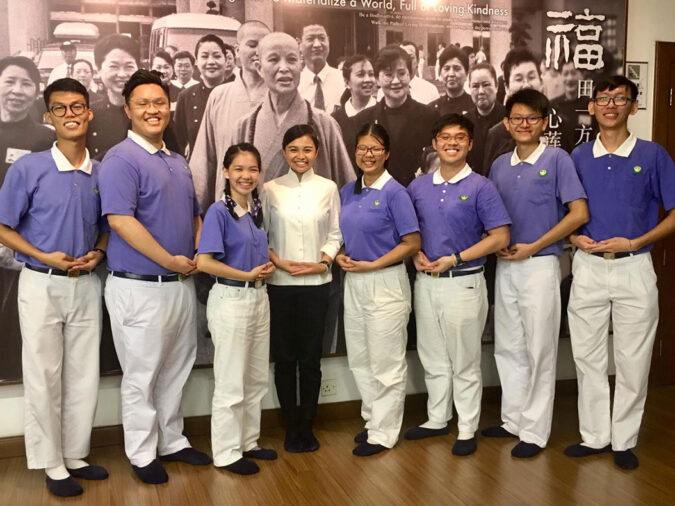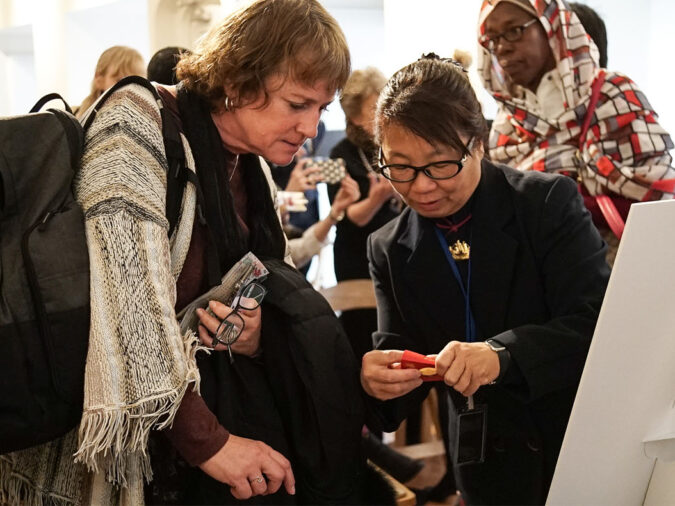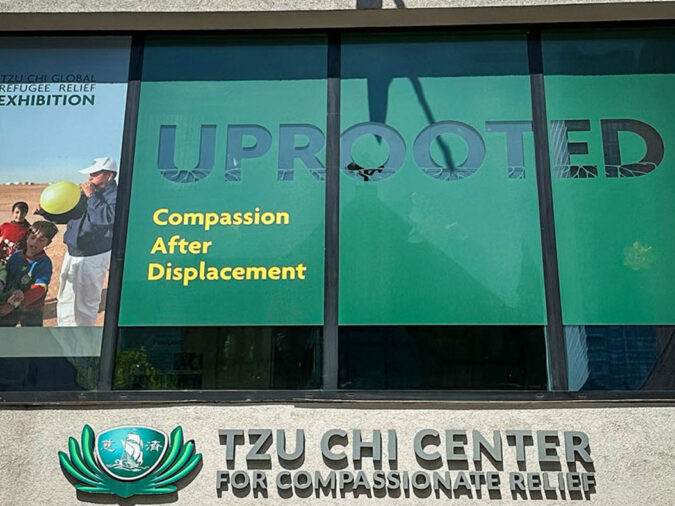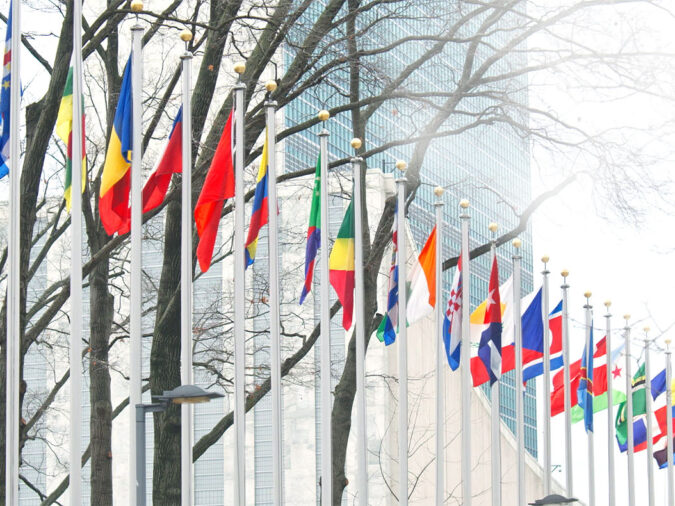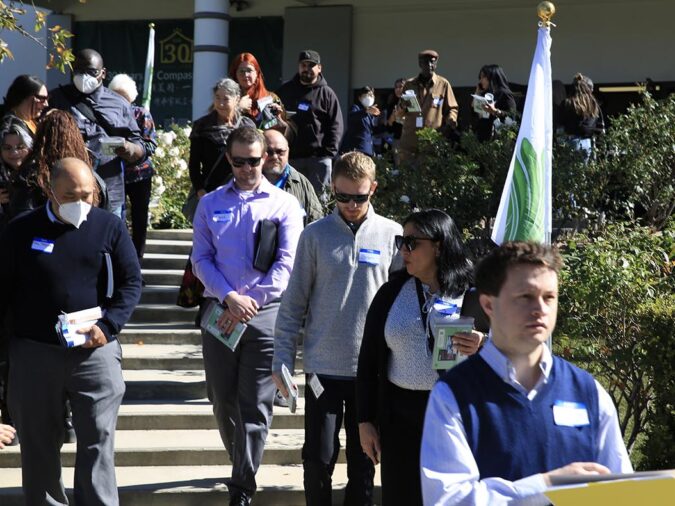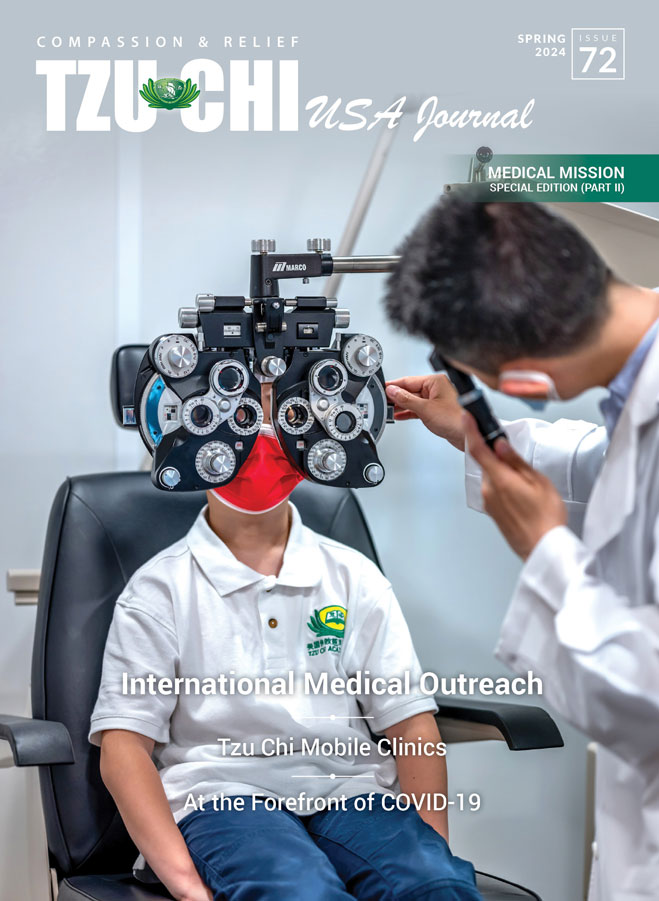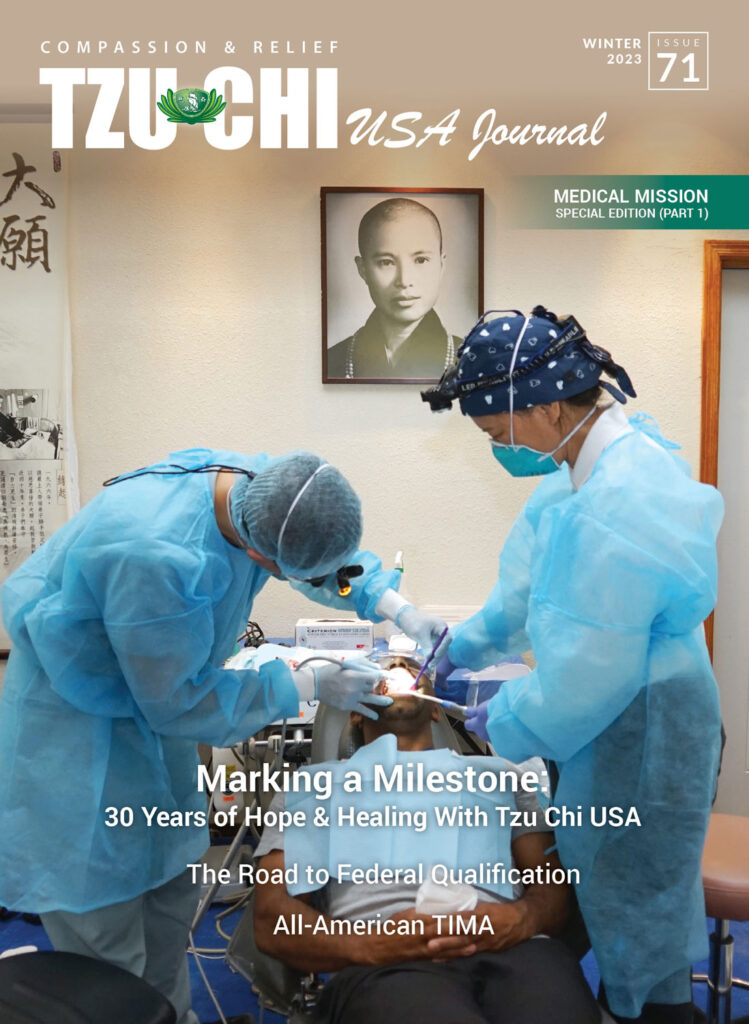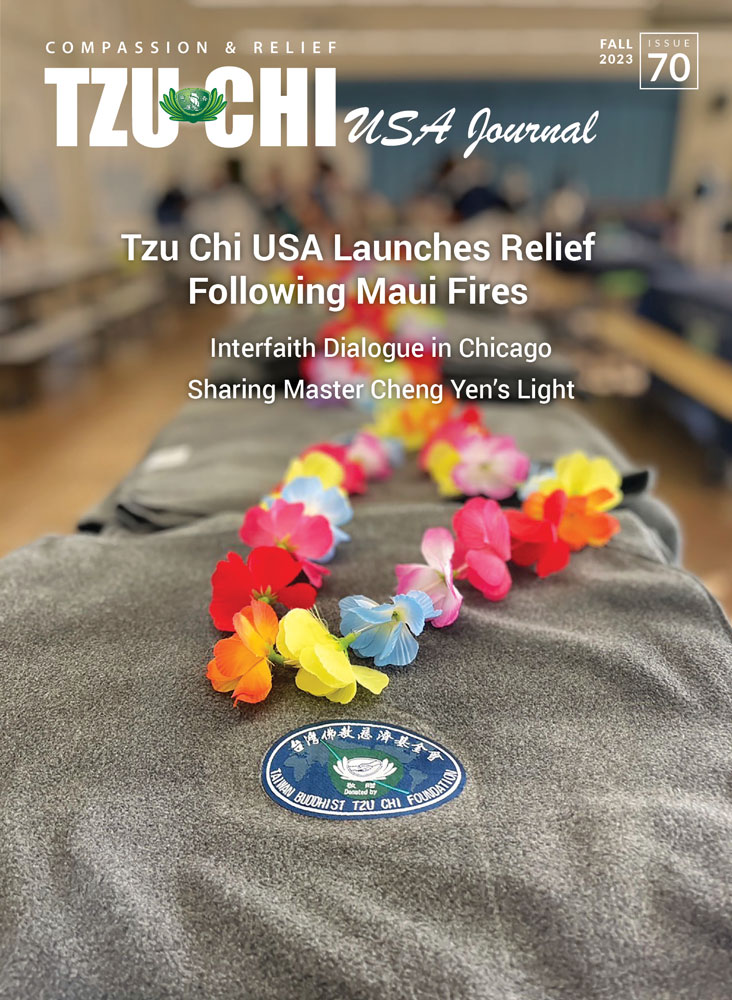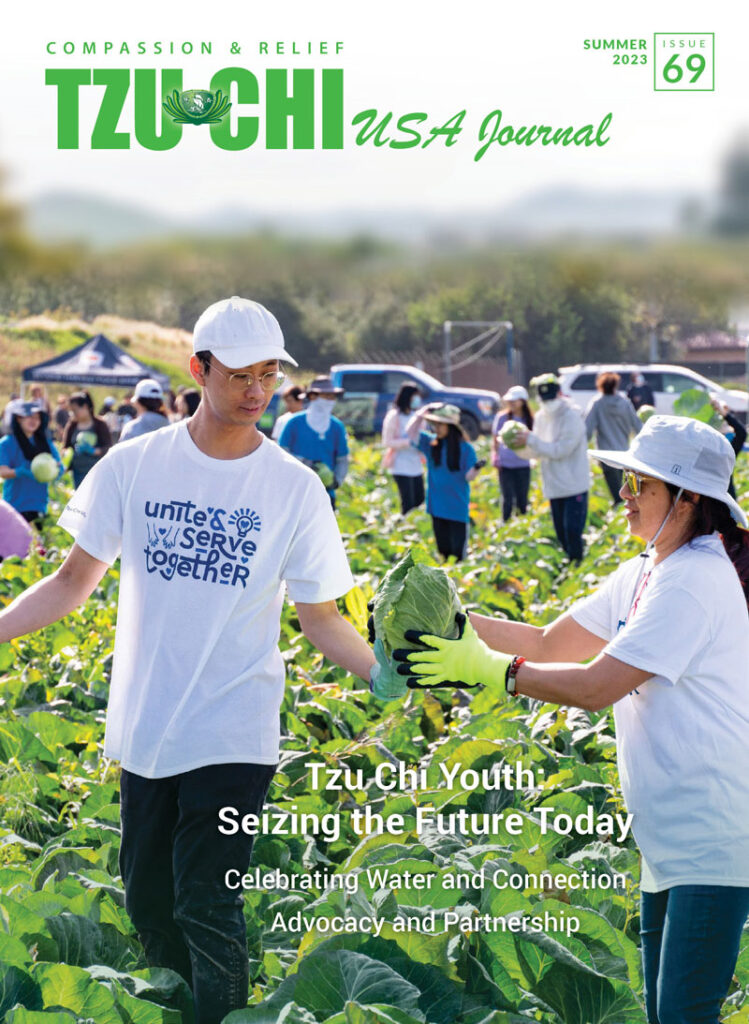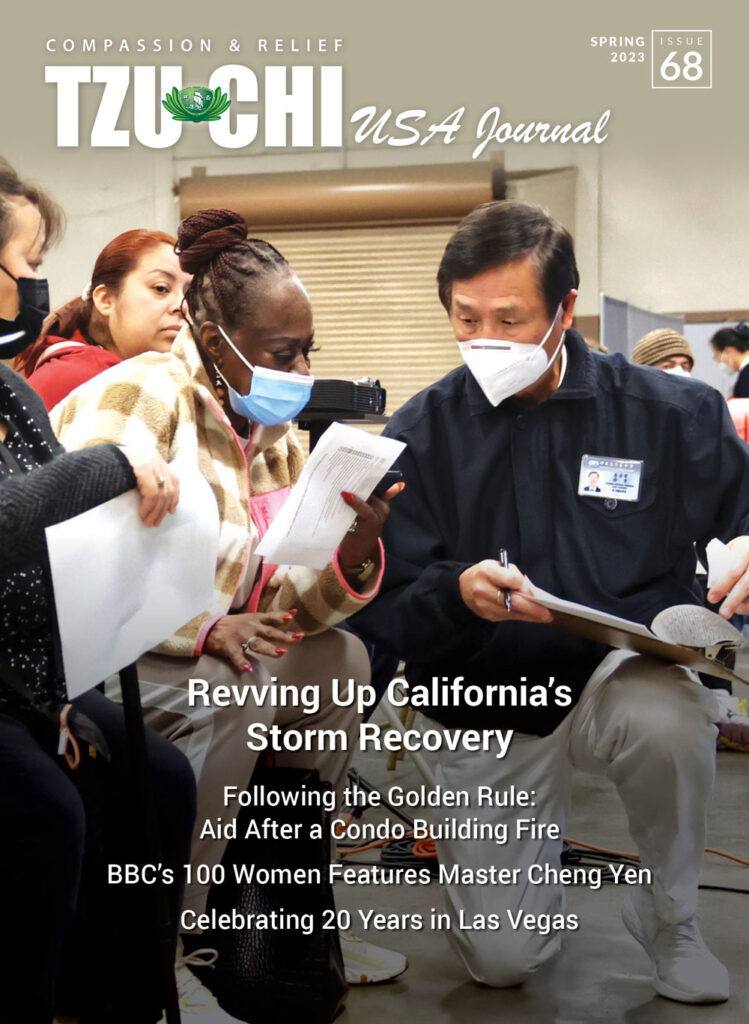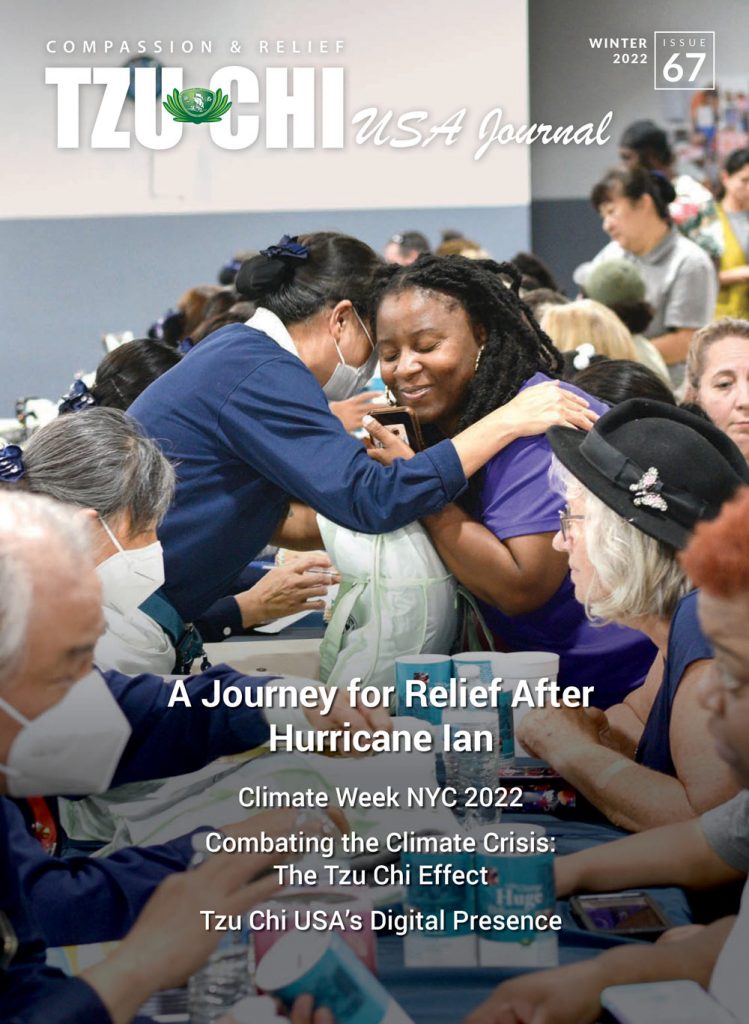CHAPTER 5
Tzu Chi USA Mobile Clinics
Origin and Development
Written by Jennifer Chien
Translated by H.B. Qin
Published #72 | Spring 2024 Issue
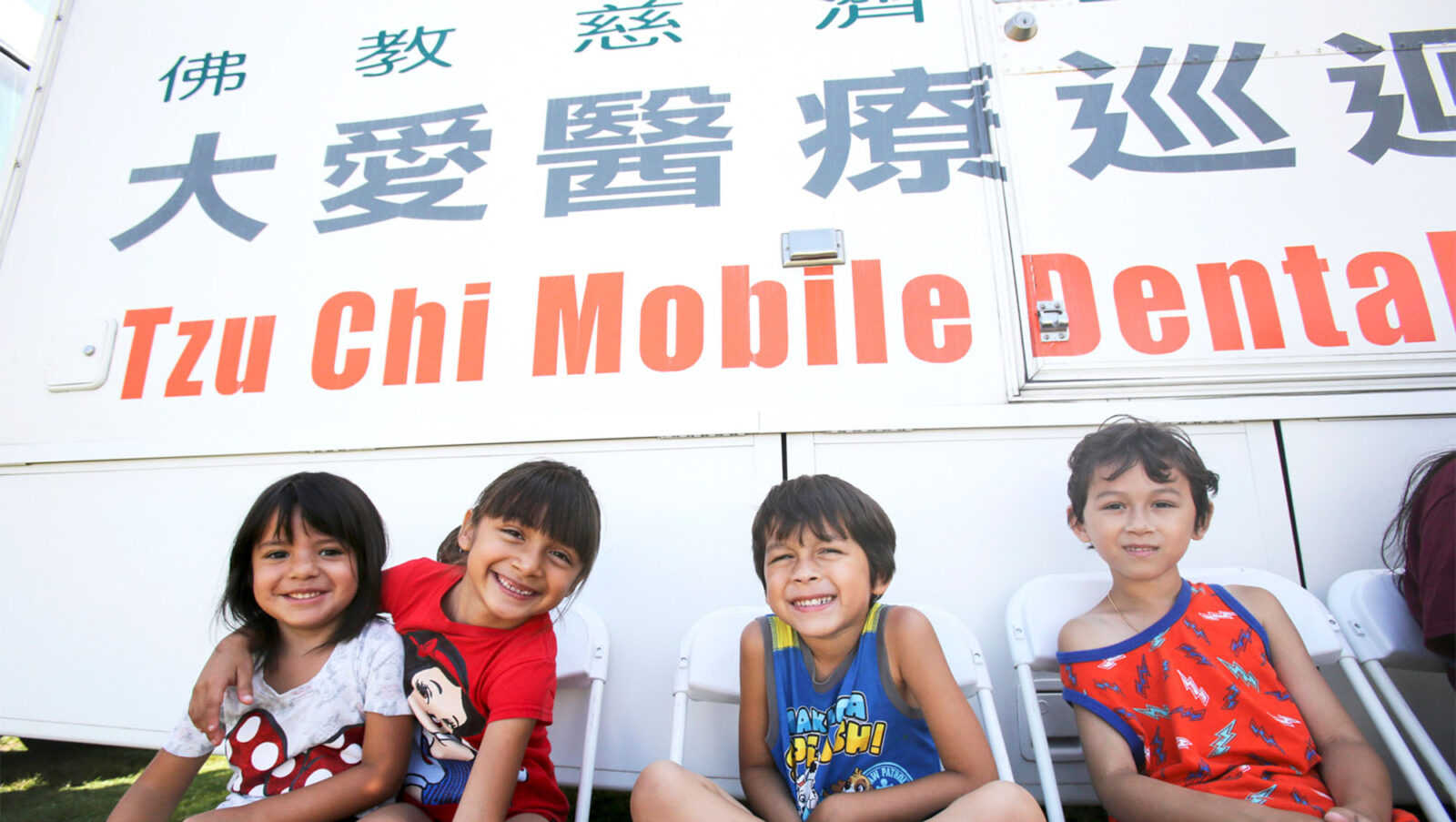
On August 19, 2017, the Buddhist Tzu Chi Medical Foundation sets out for a free Mobile Clinic outreach event in Los Angeles County. In the photo, children wait to be seen outside Tzu Chi USA’s Dental Mobile Clinic. Photo/Tzu Chi USA National Headquarters
SHARE
“When people who are suffering cannot find help, those who are blessed must go to them.” It was this advice from Dharma Master Cheng Yen that inspired Tzu Chi USA to develop a Tzu Chi Mobile Clinic team. Their steadfast efforts throughout the years have aided many of our neighbors in need, and today, in 2024, this impactful work continues as the team deploys its 12 Tzu Chi Mobile Clinics in five U.S. communities.
Tzu Chi USA’s first Mobile Clinic was put to use in 2000, bringing its services to remote and medically underserved areas. By the end of 2023, 12 active Tzu Chi Mobile Clinics, comprising services like dental and vision care, internal medicine, and cancer screenings, had been deployed in Northern, Central, and Southern California, New York, and Las Vegas. The mobile medical team consists of TIMA (Tzu Chi International Medical Association) members from local and neighboring areas, Tzu Chi volunteers, and community volunteers. The Tzu Chi Mobile Clinic fleet seeks to lift up patients with low income, people without medical insurance, migrant farmworkers, and people experiencing homelessness.
The advantage of the Mobile Clinic is that it can carry sophisticated medical equipment for specific free clinic services when traveling to remote areas. The necessary medical devices and equipment for consultation and treatment are already set up in the vehicle, which saves the time of preparing a venue for medical outreach and setting up the equipment on-site. With Tzu Chi’s Mobile Clinics, it usually takes only 10–15 minutes for the free clinic to begin after arriving at the destination. Mobile Clinic services also have the added benefit of flexibility, as they can provide small-scale free clinic events several times a week. In contrast, large-scale permanent clinics cannot follow up on patients’ conditions in this more direct and convenient manner. The compact Tzu Chi Mobile Clinic can achieve continuous medical care and follow-up, while several Mobile Clinics working together can perform large-scale, comprehensive free clinic services.
Since the first Tzu Chi Mobile Clinic event, the mobile medical team has gained the recognition of partners for long-term collaboration. A sense of warmth and dependability among partners has only strengthened over the years, and these partners have helped Tzu Chi’s medical mission go even further. According to Tzu Chi Medical Foundation statistics, the growing Mobile Clinic fleet has served a total of 293,225 patients across the U.S. from 2010 to 2022. The origin of all this outreach was a free clinic encircled by challenges at the Mexico–United States border.
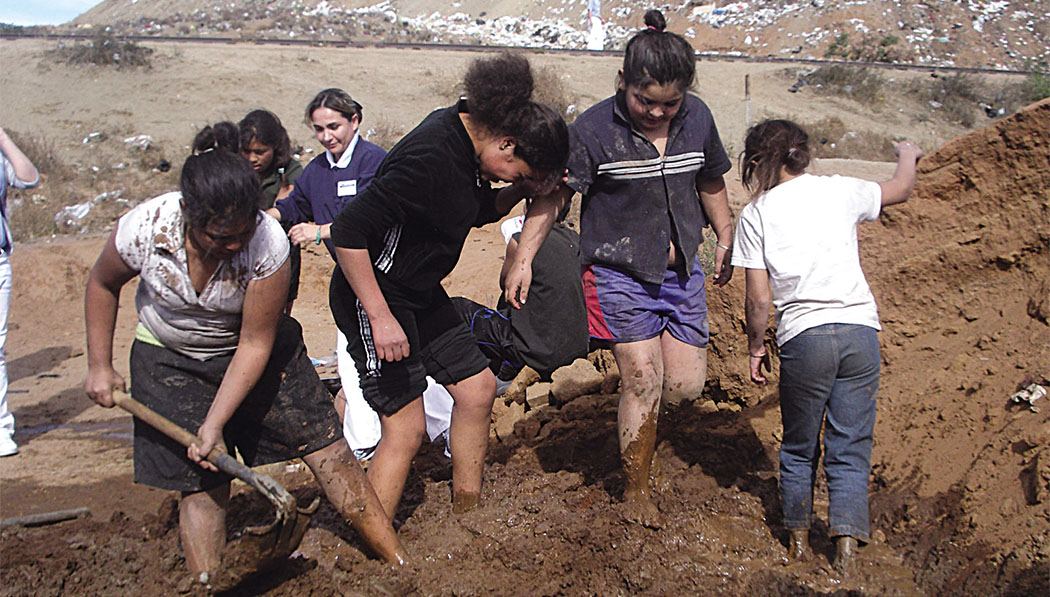
Working in the Wind and Sand
The small border city of Calexico, California, is located next to the larger city of Mexicali, which is the capital of Baja California — a Mexican state on the Baja California Peninsula. The two communities, separated by a wall, are remarkably different spaces, but they both have residents in need of medical services. It was in this transnational desert oasis that the Tzu Chi Mobile Clinic team began to form and plan how best to serve those who might not be able to come to a medical outreach event but still need medical care.
In 1993, Tzu Chi USA established its first permanent clinic in Alhambra, California, to provide free medical services to those in need. “After the establishment of the Buddhist Tzu Chi Free Clinic, we immediately started the community free clinic program. At the end of the year, we even traveled across the border between the U.S. and Mexico to the El Pipila neighborhood in Tijuana, Mexico. We also went to the Mexican border area to hold a free clinic event at the invitation of Grace Kuo, a volunteer who was living in Mexicali, Mexico,” recalled Joe C. Wang, the then-director of the Traditional Chinese Medicine (TCM) department of the Tzu Chi Free Clinic in Alhambra.
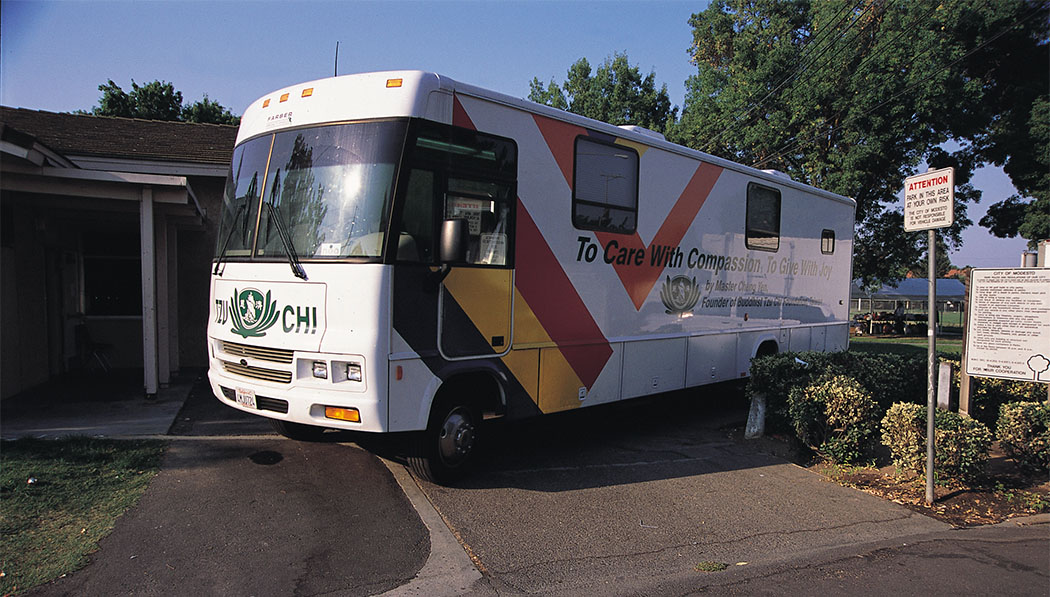
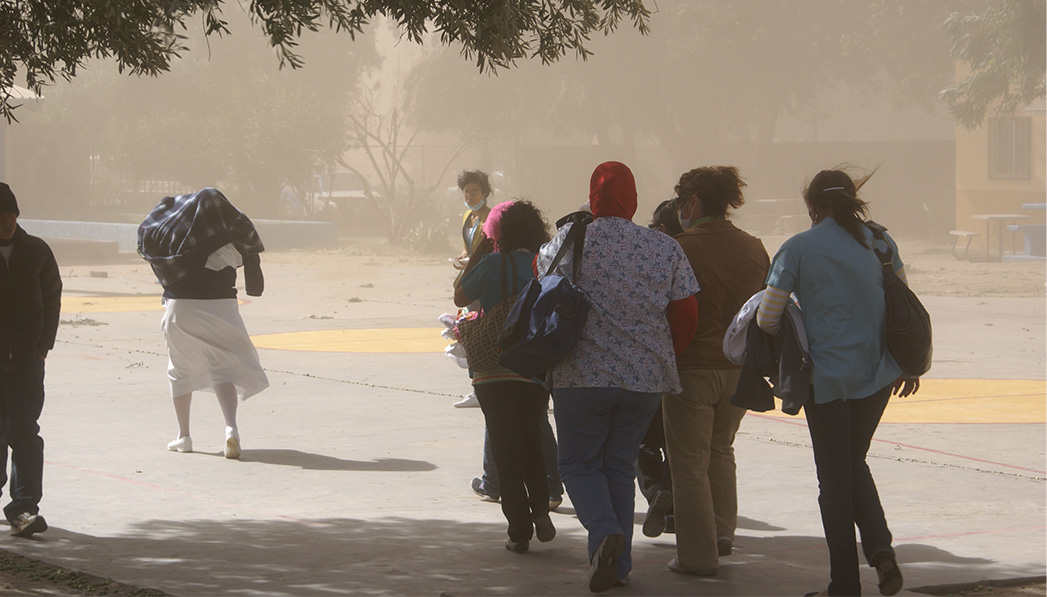
In Mexico’s remote towns and villages, medical care resources are far fewer than those in larger urban cities, and many people do not have medical insurance. Even if individuals and families enter the U.S., they may still face a similar plight.
In neighborhoods like Calexico, there are many underprivileged and recently-arrived immigrant families. Tzu Chi volunteers visited the Calexico–Mexicali community in person to learn about the medical needs of the area’s local residents. In the following years, Tzu Chi often organized free clinics in Calexico, caring for this community where summer temperatures frequently rise above 100 degrees Fahrenheit.
During a weekend free clinic in 1998, the Tzu Chi USA chapter’s TIMA team began the five-hour drive from Alhambra to Calexico at 3:00 AM, driving a van containing several heavy mobile dental instruments and other equipment.
In the temporary clinic tents set up in an open space on the city’s outskirts, the dentists often had to wipe the sweat soon to drip off their faces while shooing away insects attracted by the smell of blood when extractions were necessary. Nevertheless, they continued treating their patients with the utmost care, addressing various dental concerns. Gusts of dry and hot wind sometimes blew into the tents, stirring up sand. Occasionally, the power also cut out, or the water supply suddenly ceased.
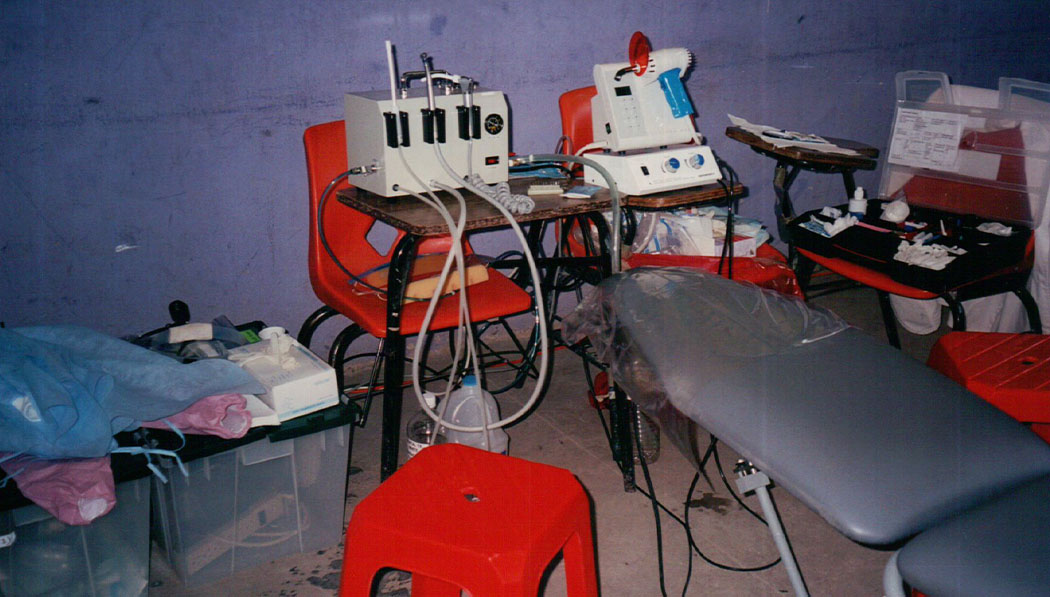
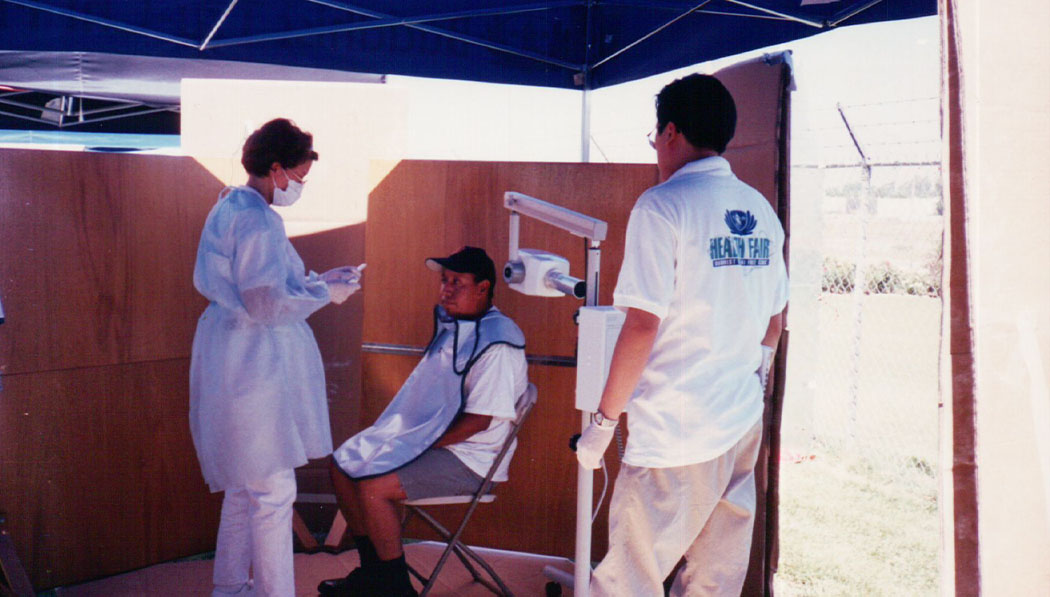
After the free clinic, while returning home as a group by bus, the dentists used the hours on the road to reflect on the activity. Dr. Shirley Chen, one of the dentists, recalled, “At that time, we were using the improved second-generation portable dental equipment for our free clinic outreach. Although the devices were convenient, the whole setup was quite bulky and had to be disassembled and reassembled. If we conducted a free clinic in a remote area where the surrounding area did not have complete water and electric facilities, the voltage would quickly become insufficient when the air conditioning and lights needed for treatment were turned on. That’s why the four or five dentists who went to the clinic on that occasion suggested that we should find a way to solve this problem.”
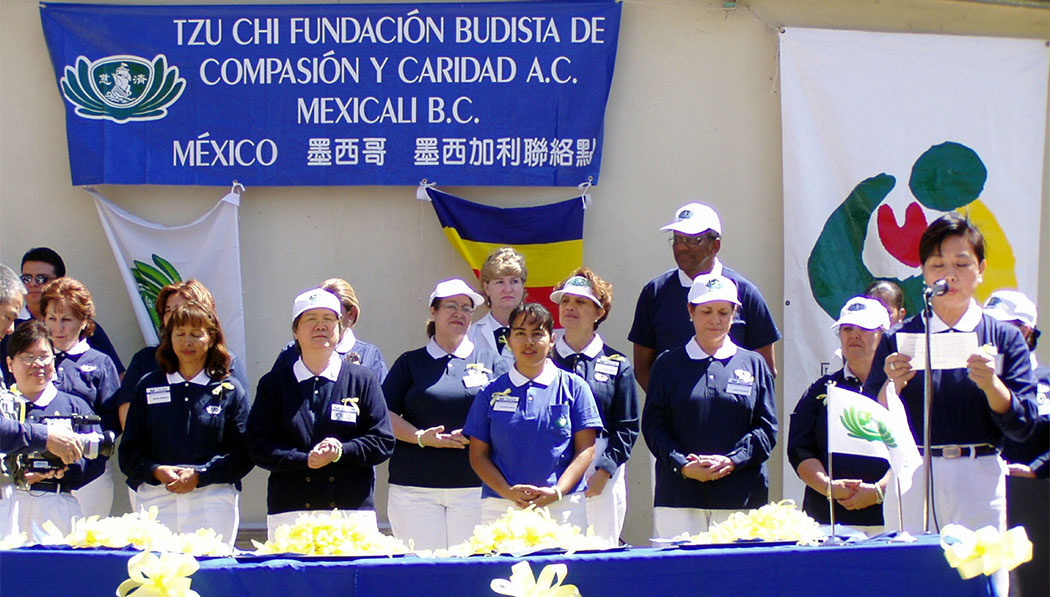
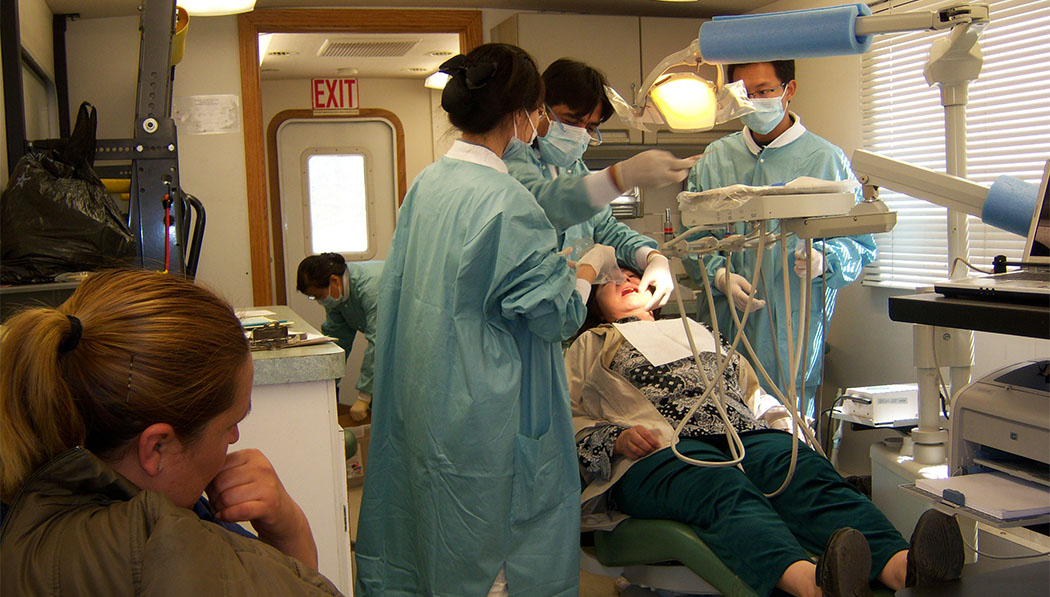
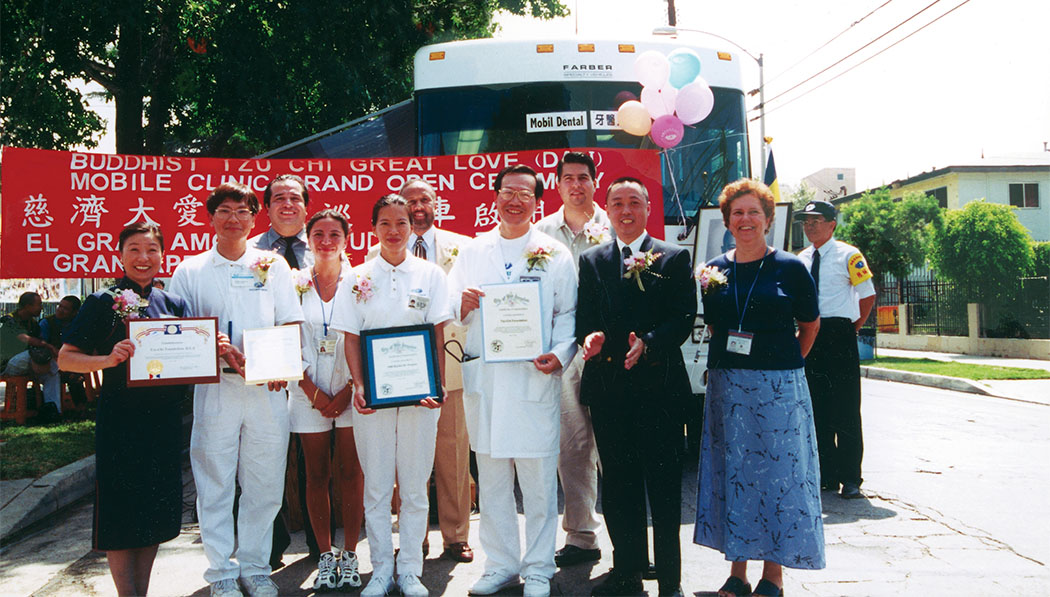
While the group was thinking about how to improve the clinic on their drive home, a large bus with a medical logo passed on the opposite lane of the expressway. Dentist Mingzhi Fang pointed out the vehicle and suggested, “That is the mobile clinic of another medical organization. [Tzu Chi] can also purchase a big bus and turn it into a mobile dental clinic with dental chairs and all the necessary equipment installed. This could solve all the problems of medical hygiene and inconvenient equipment.” Everyone on the bus unanimously approved his idea, and the group began to discuss plans for their mobile clinic.
The Tzu Chi USA chapter volunteer team immediately started a community fundraising campaign for the purchase of a Tzu Chi Dental Mobile Clinic. Dr. Mingzhi Fang led the team in designing the mobile clinic’s interior equipment and fittings. Equipped with two sets of dental chairs, the Tzu Chi Mobile Clinic finally opened its doors in July 2000, laying the foundation for Tzu Chi USA’s Mobile Clinic team, which continues to grow.
Growing Together
In 2000, Tzu Chi USA chapter volunteers raised funds to purchase their first Mobile Clinic – one equipped for dental care. Taiwanese doctor Dr. Pengfei Chen donated the second, a Medical Mobile Clinic, that same year. (Tzu Chi later dispatched this Mobile Clinic to Fresno, California, on December 7, 2008.) In 2005, Tzu Chi USA volunteers raised funds to purchase the third Mobile Clinic, one for dental care, and deployed it in Tzu Chi USA’s Northeast Region. However, since the Mobile Clinic proved unsuitable for New York’s more densely packed neighborhoods and narrow city streets, it was relocated to Fresno, California, to care for migrant farmworkers.
Since the establishment of the Tzu Chi free clinic team in Northern California, the scale of free clinics has been expanding, with dentistry being the most sought-after treatment. The Tzu Chi USA Northwest Region purchased portable dental equipment in 2003, which could not provide smooth service due to its time-consuming assembly. Therefore, it was proposed that the Northwest Region purchase a Mobile Clinic in 2004. After three years of fundraising, the Northwest Region activated its first Tzu Chi Mobile Clinic in Northern California, and the fourth in the U.S., on February 24, 2008. The Mobile Clinic is equipped with three treatment chairs, digital X-ray machines, computers, sterilizers, and more.
As more and more Tzu Chi free clinic activities have taken root in medically disadvantaged communities across the U.S., philanthropists who have seen and recognized the concept of Tzu Chi’s charitable medical care provided generous support to the Mobile Clinic fleet. This includes the donation of two Vision Mobile Clinics in 2013 and 2016, making them the fifth and sixth Mobile Clinics in the USA.
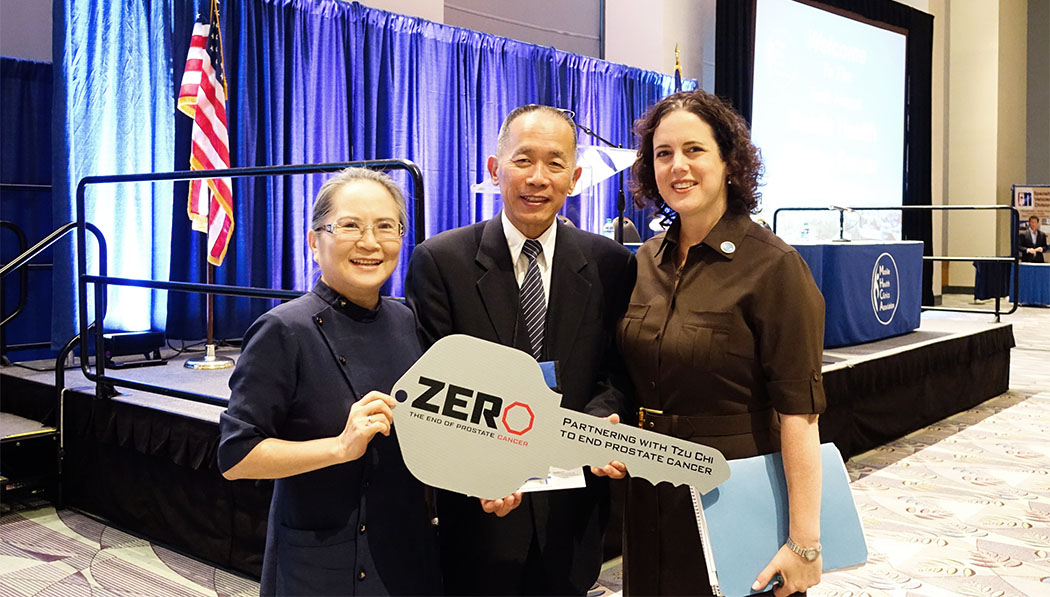
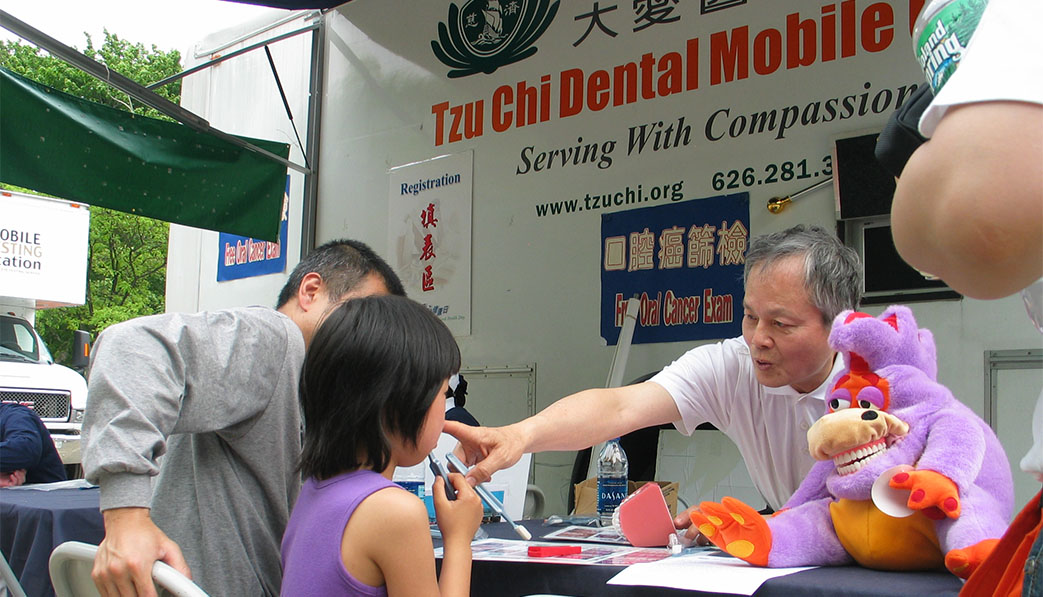
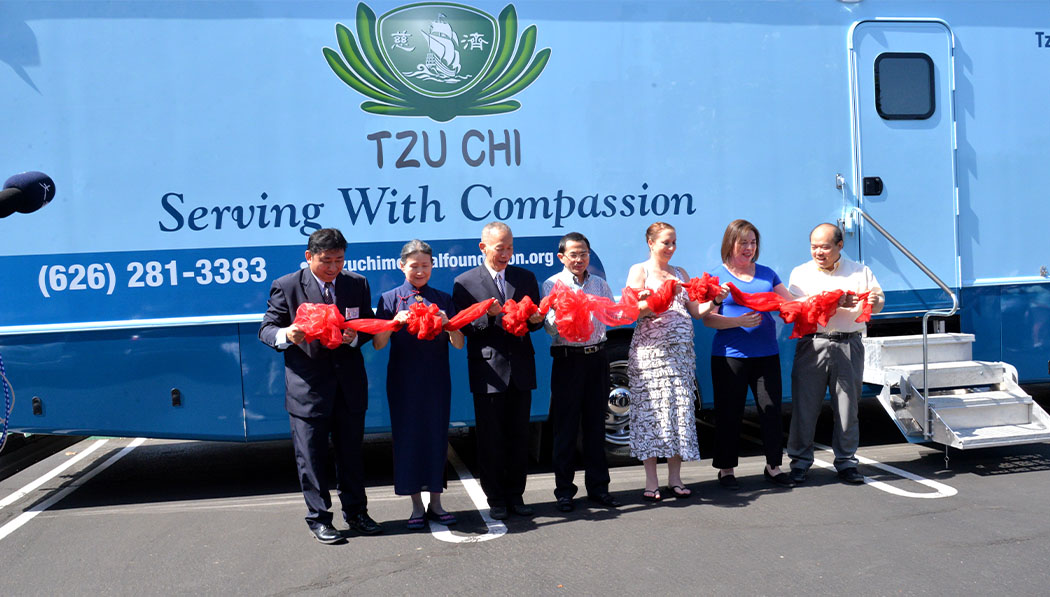
In 2014, ZERO Prostate Cancer hosted the 10th annual meeting of the Mobile Health Clinics Association in Georgia. It was announced in the meeting that the foundation would donate a Mobile Clinic for cancer screening to Tzu Chi USA. William Keh, then CEO of the Buddhist Tzu Chi Medical Foundation (BTCMF), accepted the donation on behalf of Tzu Chi USA. In his speech, Keh stated, “The number of Mobile Clinics and their popularity in the U.S. would continue to grow. The Mobile Clinic donated to Tzu Chi USA for cancer screening will provide screening and preventive treatment for people at high risk of developing prostate cancer. Tzu Chi will utilize the Mobile Clinic to provide medical care to people within a two-hour drive from the location where it parks.” The Mobile Clinic donated by ZERO Prostate Cancer was officially given to Tzu Chi during a 50th Anniversary Celebration event in 2016, making it the seventh Mobile Clinic in the United States.
The Seventh TIMA Global Forum was held at the Tzu Chi USA National Headquarters campus in San Dimas, California, on March 29, 2019. In the presence of participants from various countries, Tzu Chi Medical Foundation delivered two brand-new Mobile Clinics destined for Tzu Chi USA’s Northeast Region, expanding the scope of Tzu Chi’s mobile medical care.
These two Mobile Clinics were different from others, however. Experience in the past indicated that the densely packed neighborhoods and congested traffic conditions of New York were not suitable for a regular Mobile Clinic. Therefore, Tzu Chi New York volunteers initiated a fundraising campaign to purchase two medium-sized Mobile Clinics converted from RVs in 2019. These are the eighth and ninth Tzu Chi Mobile Clinics in the USA. Although smaller in appearance, the Mobile Clinics are just as powerful in terms of diagnostic and treatment functions.
Tzu Chi USA Mobile Clinics
Origin and Development
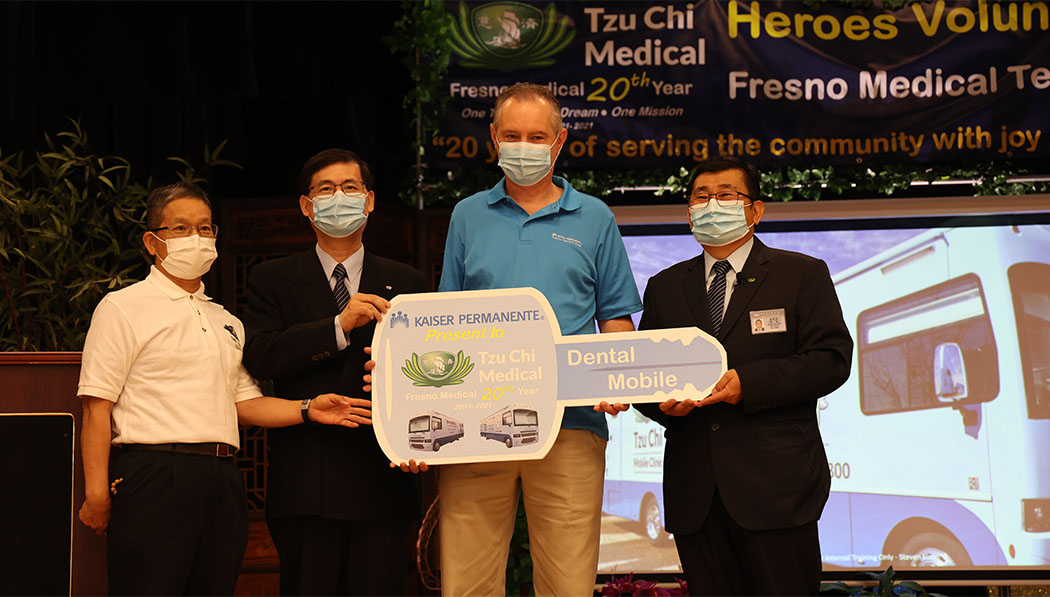
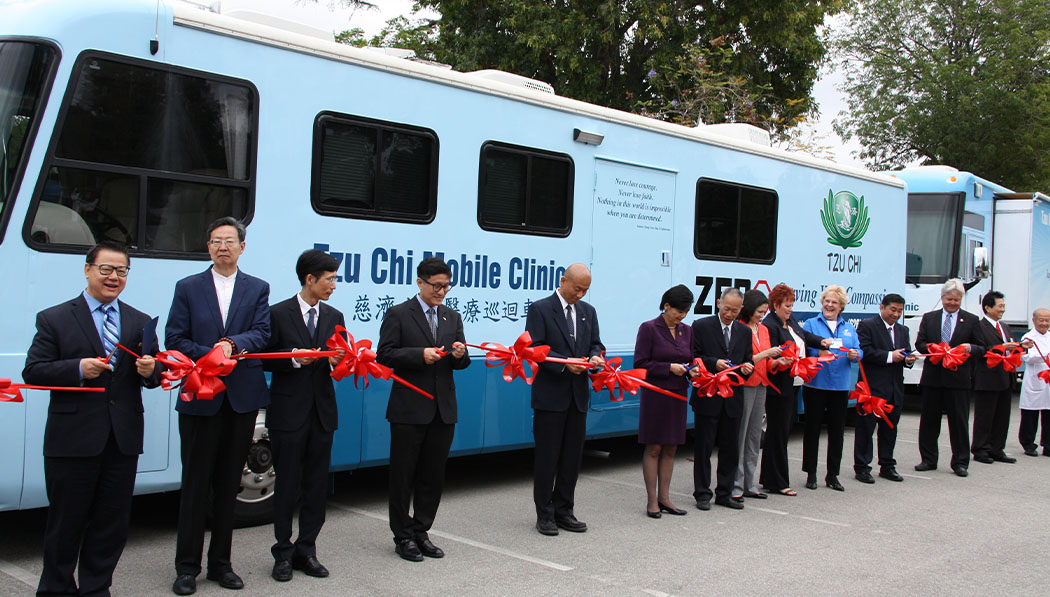
SHARE
The two Mobile Clinics stationed in New York look nearly identical but serve different functions. One Mobile Clinic’s internal equipment is specifically designed for vision care, including optometry and vision testing. The other specializes in providing on-site eyeglasses fitting services with a wide range of frame styles, so the patient can choose the frames that suit them best. Here, trained optometry volunteers can grind prescription lenses, perform adjustments, and deliver the new eyeglasses into the patient’s hands within two hours.
The 10th Mobile Clinic, equipped for dental care services, was a donation from Kaiser Permanente, which has a long-term partnership with Tzu Chi Fresno’s mobile clinic team. The donation process was completed in 2020, and the Mobile Clinic was delivered to the Tzu Chi Medical Foundation to expand dental clinic services in Central California even further.
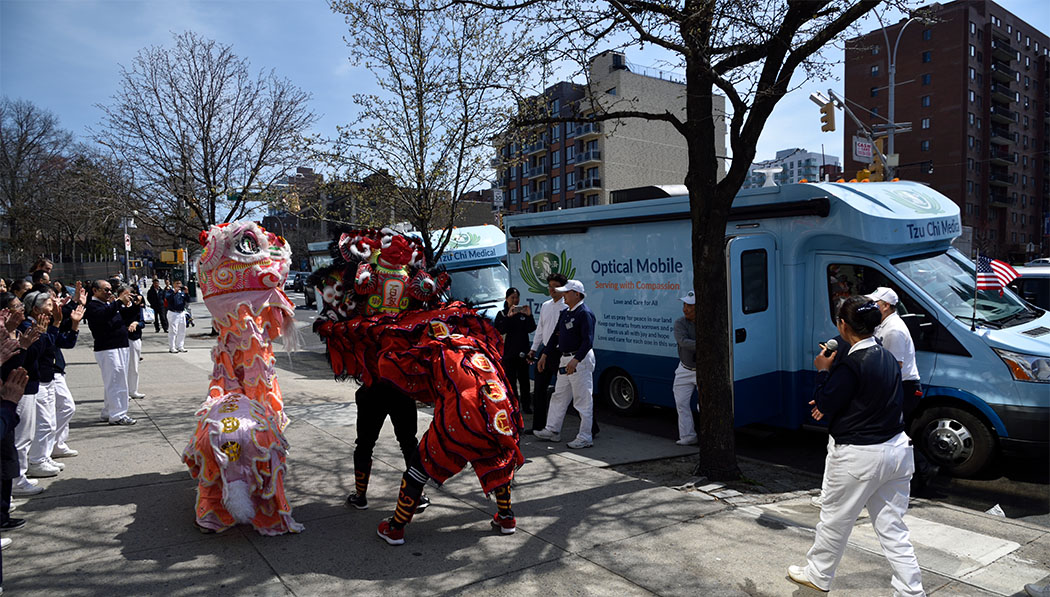
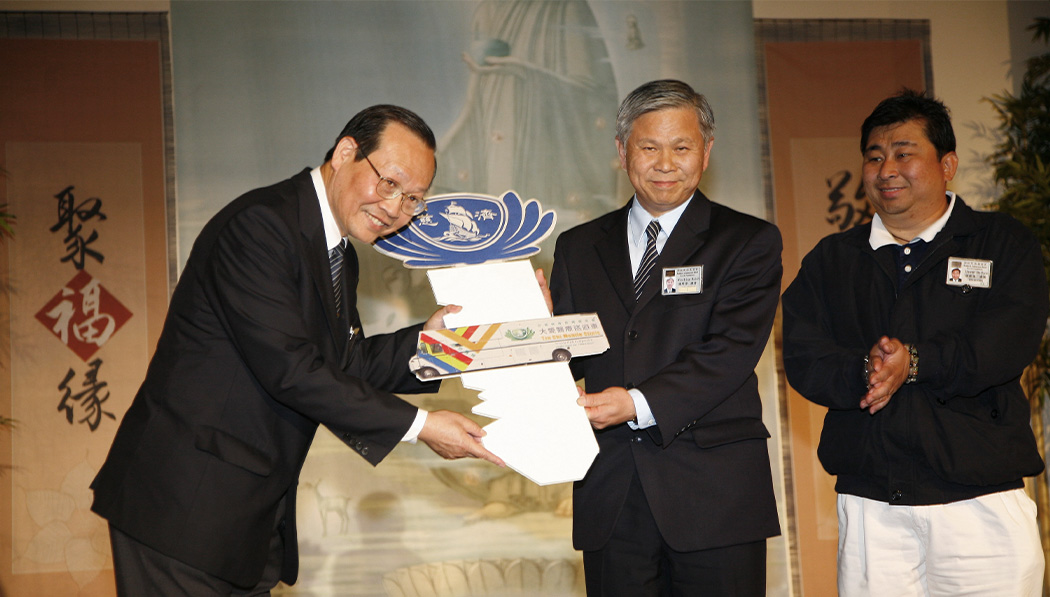
The 11th Mobile Clinic resulted from the combined love of Taiwan and the United States. Dr. Pengfei Chen, a Taiwanese physician who has been a longtime supporter of Tzu Chi’s U.S. medical mission, donated $500,000, which, along with an added $200,000 from the Medical Foundation, enabled a new vehicle to join the Mobile Clinic fleet. The newly outfitted Vision Mobile Clinic was delivered in 2023 and stationed at the Tzu Chi Las Vegas Service Center, mainly serving children from underprivileged families.
In late November 2023, Tzu Chi volunteers traveled to a mobile clinic vehicle facility in Indiana to receive the Dental Mobile Clinic donated by the Mother Cabrini Health Foundation in New York. The new Mobile Clinic was officially added to the list as the 12th Mobile Clinic in the U.S., and will assist Tzu Chi USA’s Northeast Region in providing free dental care for disadvantaged families.
A Reliable Guide
In 2015, key figures from Fresno’s mobile clinic team — Steven Voon, BTCMF’s Executive Vice President and Director of Mobile Clinics, and Olivia Chung, Fresno Mobile Clinics Manager — released the first edition of their Mobile Medical Care Guidelines for California, which established a set of standardized process models for Tzu Chi’s mobile medical events in communities. The second edition of the Mobile Medical Care Guidelines, used initially only in Fresno, has become the standard for Tzu Chi’s free clinics throughout the United States. According to Voon, the main purpose of the Mobile Medical Care Guidelines was to establish a standardized process for uniformly providing quality care and treatment. After countless free clinics, volunteers have more valuable experiences to share with each other, and Voon and Chung have begun to compile a third edition, which is scheduled to be released in 2024.
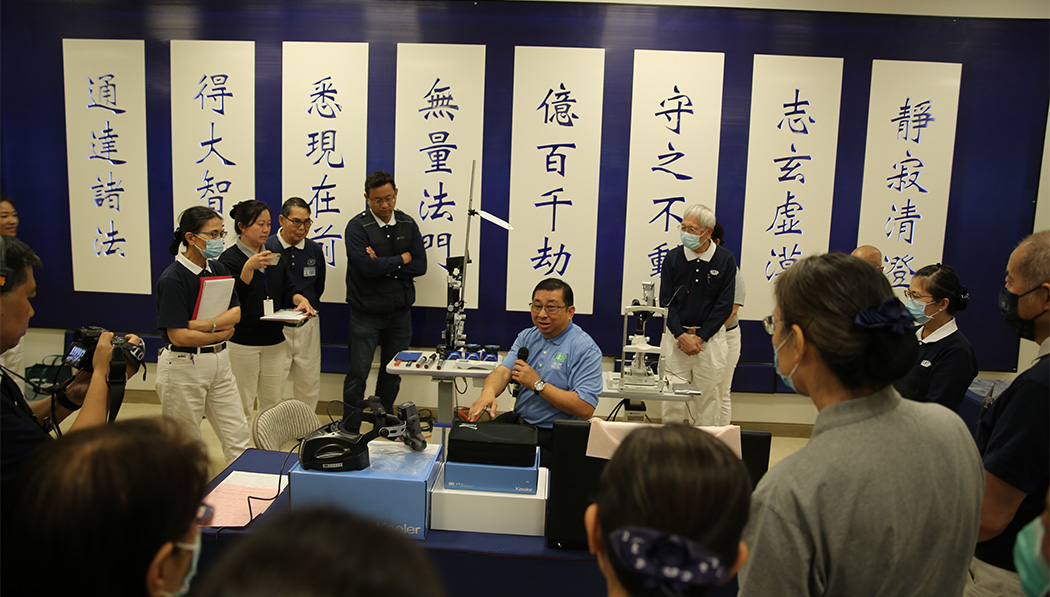
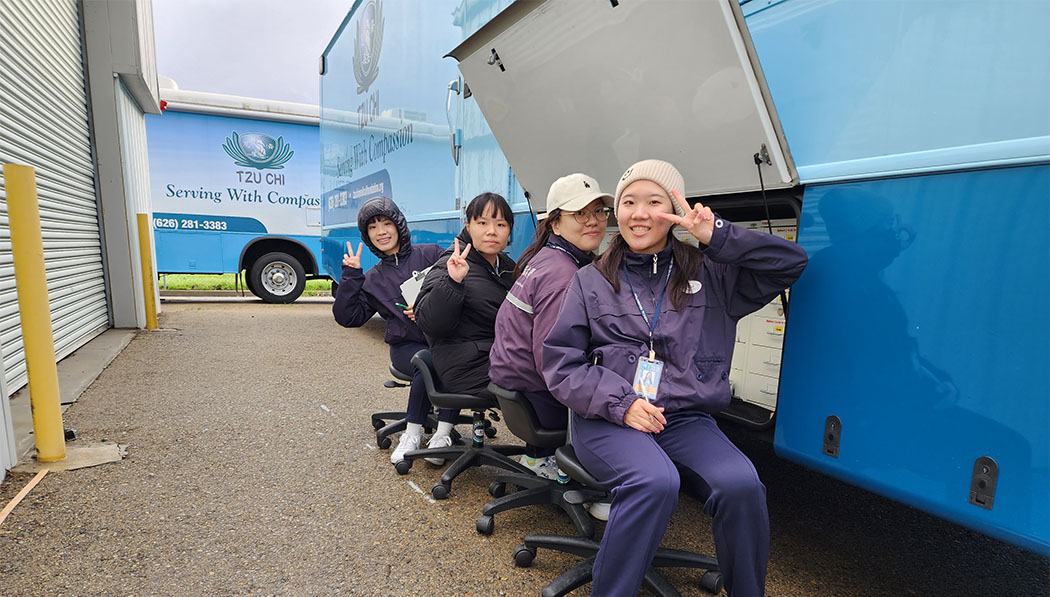
SHARE
In addition to having a guideline, Olivia Chung believes that regular training can lead medical volunteers to a better understanding of each other and build a team with a cohesive force: “Since 2015, the Fresno mobile clinic team and the New York team have held annual medical training, sharing clinic experience, equipment operation training, and networking. The discussion of actual cases reflects the real and urgent medical needs of local communities, and it is also the only way to gather more forces, donations, and sponsorships to implement our charity medical programs effectively.”
The medical training helps collect useful data on the free clinics, allows the teams to evaluate the program’s effectiveness, and then calculate the cost-effectiveness through the data and insights. Only with this management mindset can the team fully utilize every bit of funding to provide high-quality free clinic services.
The benefits that came forth from the 2018 TIMA Annual Conference in Fresno were far-reaching. First, the New York team set the goal of purchasing a Vision Mobile Clinic even before they departed for New York after the event, and achieved their goal in just 12 months. The Fresno mobile clinic team’s work impressed Tzu Chi volunteers from Las Vegas. For two years in a row after that, in 2018 and 2019, Fresno’s mobile clinic team was invited to Las Vegas to share how to build an active team and start a sustainable medical care program locally.
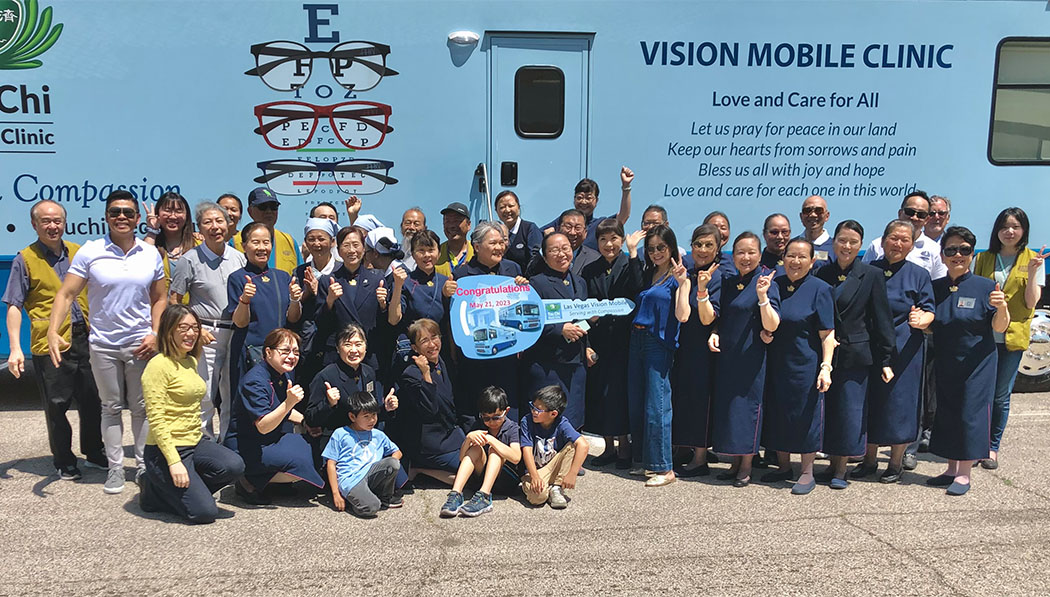
With fearless commitment and unwavering motivation, Las Vegas volunteers raised funds to purchase equipment for portable eye exams in 2019, and held their first local vision clinic a week after receiving the equipment and training. Since they had not yet purchased the equipment to grind the lenses, the Fresno Mobile Medical team sent samples of frames to Las Vegas, so that patients in need of eyeglasses could choose their preferred frames. The results of their eye tests would be sent to Fresno, where the mobile clinic team undertook the follow-up work, and sent the finished eyeglasses to Las Vegas within 24 hours of receiving the prescription. Tzu Chi’s relay of love brought the first free vision clinic in Las Vegas to a perfect conclusion.
Witnessing mobile clinic teams taking shape in other states, Olivia Chung is convinced that as long as one has the will and the power, the impact can be limitless.
The success of a team does not lie in the number of its volunteers, but comes from having faith, a sense of mission, and a mindset of constantly striving for improvement.
Olivia Chung
Manager
Fresno Mobile Clinics
A Group That’s Small and Adaptable
“In the past, when Tzu Chi did free clinics, as long as we knew there was a need in the local area and there were openings for our mobile clinic and medical volunteers, we could go out to do it, so that the effectiveness of the mobile clinic vehicles could be maximized. Every time there was a free clinic event in the community, we were often able to serve hundreds of patients,” said Shirley Chen, who is currently BTCMF’s Medical Development Department Director. “After Obamacare was enacted, the number of uninsured people who need to visit the free clinics in the community has been reduced year by year, which is a result of the increase in the proportion of residents who are covered by medical insurance,” reflected Chen.
The 44th President of the United States, Barack Obama, signed the Affordable Care Act, also known as Obamacare, in 2010. The Act, which prompted a major change in the nation’s medical care and medical insurance, went into effect in 2014.
“Starting from 2015, the community free clinics that used to receive thousands of patients have been slowly sized down. That year, TIMA USA reported to Taiwan that we would switch to a smaller clinic model in the future,” Steven Voon explained regarding changes in the Mobile Clinic model. “We need to go deeper into the community in each location, and we need to use the Mobile Clinic as the main center to hold free clinics, connecting volunteers with community partners, such as schools and organizations, and leading the community organizations to do it together with a ‘Run by Program’ approach.”
The enforcement of Obama Care drove Tzu Chi volunteers to think about how mobile medical care could further help meet the needs of communities while staying sustainable. In 2020, the three health centers under the Medical Foundation were awarded Federally Qualified Health Center Look-Alike (FQHC Look-Alike) status, which would lead to the increased consolidation of mobile medical resources across the country.
“A Tzu Chi Mobile Clinic vehicle is considered an independent clinic that’s eligible for partial subsidies from the government,” said Shirley Chen. “The experience of successfully applying for FQHC Look-Alike accreditation in Los Angeles County can be used as a model for Mobile Clinics across the U.S. to apply for federal qualification in the future.”
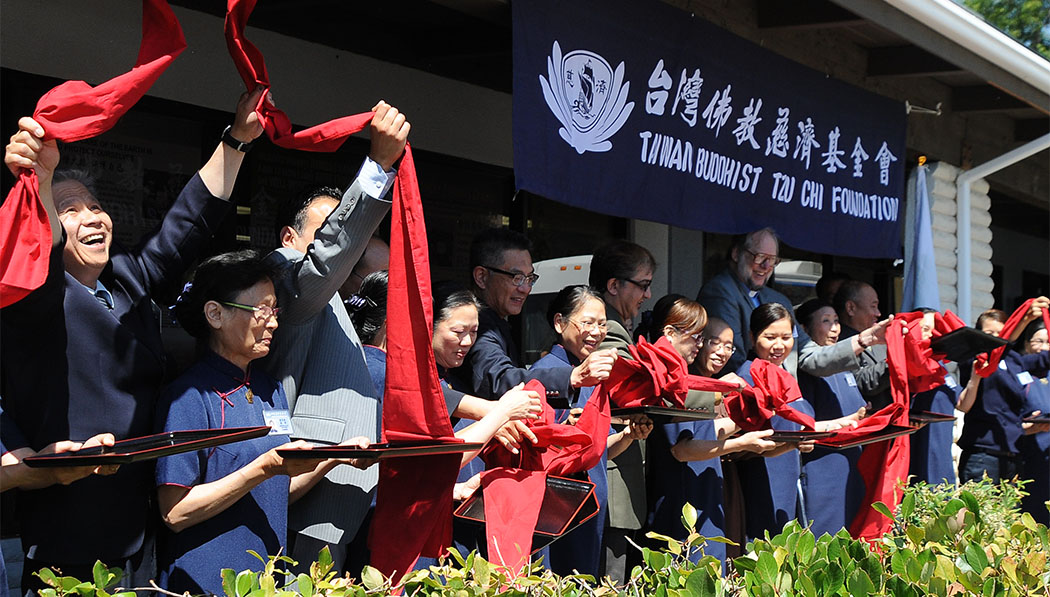
The Mobile Medical Care Guidelines developed by the Fresno mobile clinic team created a model that also shows a clear path for the source of funding for free clinics nationwide. Steven Voon believes that the Fresno mobile clinic team’s track record of conducting more than 150 free clinics each year could be achieved by any other mobile medical team in the United States.
“Free clinic projects such as See 2 Succeed, Senior We Care, Healthy Fresno, and Care 4 Highway 99 are not funded by Tzu Chi alone,” shared Voon. “What we intend to do is project-based free clinics, in which Tzu Chi provides the professional platform, complete medical equipment, and a perfect volunteer system to carry it out quickly; as long as community organizations have the intention of doing good deeds, they can simply approach Tzu Chi for collaboration,” he explained.
In other words, local partners and other community organizations don’t need to launch new service programs; by providing funding or supplies, they can partner with existing programs and accomplish quality, free care in the community — as a community. And, it is through this collaboration with community organizations that Tzu Chi could promote awareness among more people and organizations, which will, in turn, promote greater access to medical care.
With more free clinics, Tzu Chi volunteers will be able to reach out to more people in the communities and medical professionals, which in turn will allow more people to recognize Tzu Chi, join Tzu Chi, and work together to do Tzu Chi activities.
Steven Voon
Executive Vice President
Buddhist Tzu Chi Medical Foundation
With the support of federal and community resources, smaller and more flexible free outreach clinics are expected to spread like fireflies that light up the night. When mobile medical teams can expand sustainably, hand-in-hand with the community, free clinic volunteer services can reach more areas.
